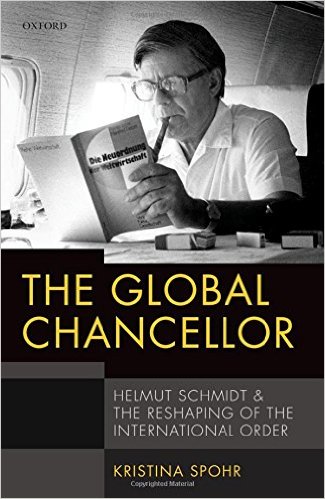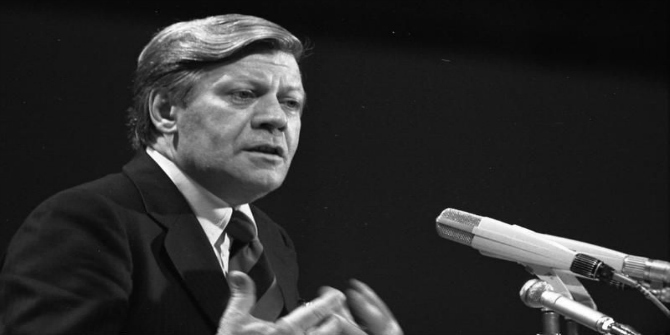In The Global Chancellor: Helmut Schmidt and the Reshaping of the International Order, Kristina Spohr (LSE, International History) reevaluates the Federal Republic of Germany’s fifth chancellor, Helmut Schmidt, from the perspective of his contribution to international diplomacy in the early stages of globalisation. Schmidt emerges as a leader whose unique attributes and comprehensive understanding of international finance and security issues helped to stabilise an international system on the brink of crisis. Reviewed by Patricia Hogwood.
The Global Chancellor: Helmut Schmidt and the Reshaping of the International Order. Kristina Spohr. Oxford University Press. 2016.
 By the time of his death in 2015, aged 96, Helmut Schmidt had taken on the role of elder statesman in Germany, an ‘omniscient counsellor’ (Universalratgeber) who pronounced on all significant social, economic and political matters. However, his legacy as chancellor (prime minister) remained overshadowed by the greats, Konrad Adenauer and Willy Brandt, and his successors, Helmut Kohl and Gerhard Schröder. Schmidt was criticised for his managerialist style and a lacklustre approach to domestic challenges that ultimately split his Social Democratic Party (SPD) and brought down his government. Contemporaries and historians alike have found his legacy hard to define, lacking in landmark policy change or enduring achievements.
By the time of his death in 2015, aged 96, Helmut Schmidt had taken on the role of elder statesman in Germany, an ‘omniscient counsellor’ (Universalratgeber) who pronounced on all significant social, economic and political matters. However, his legacy as chancellor (prime minister) remained overshadowed by the greats, Konrad Adenauer and Willy Brandt, and his successors, Helmut Kohl and Gerhard Schröder. Schmidt was criticised for his managerialist style and a lacklustre approach to domestic challenges that ultimately split his Social Democratic Party (SPD) and brought down his government. Contemporaries and historians alike have found his legacy hard to define, lacking in landmark policy change or enduring achievements.
Kristina Spohr’s reappraisal of Schmidt’s chancellorship, The Global Chancellor: Helmut Schmidt and the Reshaping of the International Order, is set on a wider stage. Spohr paints Schmidt as a pivotal figure who actively shaped international affairs in a decade torn by crisis. Schmidt’s term of office (1974-82) spanned the global economic uncertainties following the collapse of the Bretton Woods financial system and successive oil crises, and the faltering détente between the superpowers of the USA and USSR. Inevitably, these pressures raised the international profile of the Federal Republic of Germany (FRG) and its conflicted relations with the ideologically opposed German Democratic Republic (GDR). In an era when global affairs impinged directly on political, social and economic stability across national borders, the two Germanies embodied the Cold War standoff.
Spohr argues that Schmidt’s economic acumen and diplomatic skills were decisive for the emergence of (West) Germany as a politically stable state and world economic leader. Building on Adenauer’s legacy of forging a firm alliance with the western powers (Westbindung) and Brandt’s new direction in opening more constructive relations with the eastern bloc (Neue Ostpolitik), she claims that Schmidt simultaneously continued the post-war work of rehabilitating Germany in the heart of Europe and worked towards a stabilisation of Cold War international relations. Further, Spohr attributes Schmidt with prescience, a man ahead of his time in anticipating the dynamics of the emerging ‘globalisation’ of international relations.
 Image Credit: Helmut Schmidt, 1976 (Wikipedia Public Domain)
Image Credit: Helmut Schmidt, 1976 (Wikipedia Public Domain)
She contends that Schmidt was decisive in the development both of informal summitry and of the collective international diplomatic and consultative institutions and mechanisms (particularly the instigation of the Group of Seven (G7) and European Monetary System (EMS)) needed to facilitate cooperation in a world marked not only by geopolitical and ideological conflict, but also by increasing interdependence. Schmidt foresaw and engaged with the seismic geopolitical changes taking place with China’s emergence as a world power. Spohr also credits Schmidt with the embedding of NATO’s 1979 ‘dual-track’ strategy in a move that, together with his intermediary role as ‘double interpreter’ between Moscow and Washington, helped to defuse the Cold War. Furthermore, she argues that if Schmidt had not been so successful in turning West Germany into a major diplomatic actor in the 1970s, Kohl would have found it much more difficult to achieve German unification when the bipolar structures of global international relations imploded in the late 1980s.
Spohr’s argument is presented in a largely chronological narrative, overlaid with thematic chapters that highlight Schmidt’s international leadership skills: the world economist, the strategist of balance, the defusing of the neutron bomb, the constructor of the dual track and the double interpreter. A discursive conclusion touches on many of the issues raised. Throughout the work, Spohr develops a scholarly and well-reasoned argument. A technique of interweaving formative influences on Schmidt the man into the leading narrative on international diplomacy demands close attention from the reader, but is effective in prioritising Schmidt’s leadership credentials and in identifying elements of his legacy.
Spohr succeeds in demonstrating that Schmidt was more than a reactive or pragmatic crisis manager: that his actions were consistent with a wider strategic and intellectually informed framework. Occasionally prone to overstatement, on her own terms she nevertheless makes good her claim that ‘No other statesman of the 1970s was both a doer and thinker on this scale’ (2). By delimiting her study largely to the international arena and Schmidt’s own prioritisation of what he perceived as the ‘two truly existential’ threats of a potential collapse of capitalism and the threat of a third world war, she is able to demonstrate that Schmidt’s particular attributes marked him out as the outstanding leader of his day. Schmidt’s personal failings – most vividly expressed in his catastrophic personal relationship with US President Jimmy Carter – are acknowledged, but his ‘legacy’ failings are sometimes dismissed a little too readily as a product of an unpromising international environment.
However, in restricting her approach largely to documentary analysis, Spohr does not satisfactorily address the problem of the absence of counterfactuals. Would another chancellor have taken more or less cognisance of the early impacts and implications of globalisation, or spotted the rise of China as a global force to be reckoned with? Would another chancellor, spurred on by the responsibilities of Cold War relations at the German coalface, have contributed less or more to the development of the western alliance in terms of the institutionalisation of information sharing, cooperation and collective action? We simply don’t know.
The book and its central advocacy of Schmidt as a protagonist of new modes of multilateralism would also benefit from some consideration of international relations theory. Given the book’s subtitle ‘Helmut Schmidt and the Reshaping of the International Order’, the absence of a theoretical dimension is a little disappointing. Early references to theories expounding individual political agency in international relations (Putnam, 1988; Waltz, 1959; and Spanier, 1972) go undeveloped. A critical engagement with these works might have offered some insight into Schmidt’s difficulties in reconciling his international leadership role with his domestic role of chancellor.
Likewise, it might have been useful to link Schmidt’s international diplomacy with the (neo)liberal approach in international relations theory that developed in the context of the Cold War (e.g. Deutsch et al, 1957; Keohane and Nye, 1977; and Krasner, 1983). These works and others offer an analytical perspective on ‘security communities’ and their incorporation of shared values, the development of common understandings of international challenges and the potential role for multilateral institutions in the governance of collective security problems. Insights from this body of literature would have permitted a more analytical reflection on Schmidt’s deployment of Realpolitik (or, to his detractors, ‘neo-Cold Warrior’ tactics) at the same time as demonstrating an unswerving commitment to the development of international fora for diplomacy and policy development at the highest levels.
In offering an in-depth study and sympathetic evaluation of the political life and legacy of Helmut Schmidt, the neglected chancellor, The Global Chancellor makes a major contribution to our understanding of German leadership and Cold War diplomacy in the tense and uncertain decade of the early 1970s-80s. This work will be appreciated by advanced students of post-war European history and by a wider audience of interested readers, particularly those who lived through these extraordinary times.
Patricia Hogwood is Reader is European Politics at the University of Westminster. She has published on UK devolution and EU policy-making in a comparative context. Her other research interests include EU immigration policy and the externalisation of internal security and the impacts of German unification on German identity, democracy and public policy. Read more by Patricia Hogwood.
Note: This review gives the views of the author, and not the position of the LSE Review of Books blog, or of the London School of Economics.





 Visit our sister blog: the LSE British Politics and Policy Blog
Visit our sister blog: the LSE British Politics and Policy Blog 